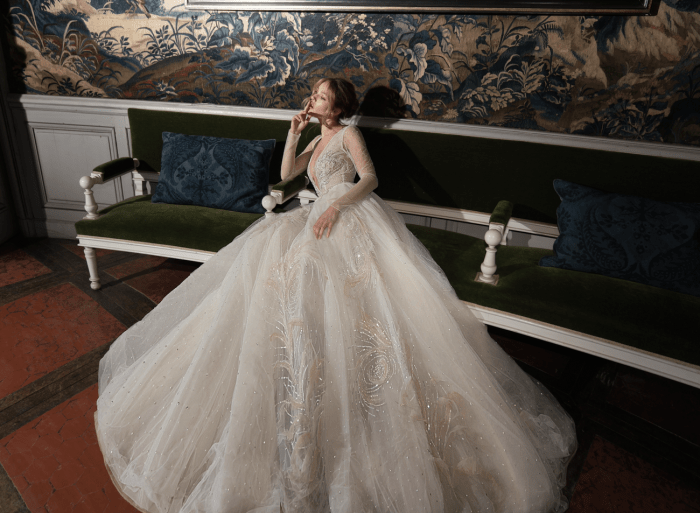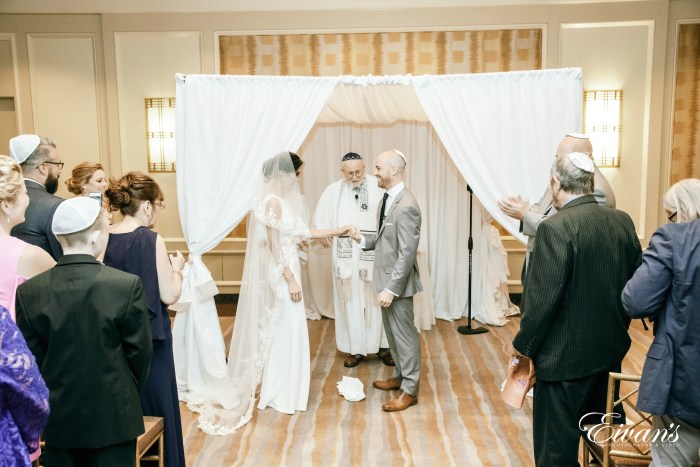Dress Styles for Jewish Weddings
Dresses for jewish wedding – Choosing the right attire for a Jewish wedding requires understanding the varying levels of formality and cultural nuances. The dress code can range from black-tie elegance to more relaxed semi-formal or even casual settings, depending on the couple’s preferences and the specific event. Understanding these nuances will ensure you dress appropriately and respectfully.
Dress Styles for Different Formality Levels
Black-tie Jewish weddings often call for floor-length gowns in rich fabrics like silk or velvet. Semi-formal events allow for more flexibility, with knee-length or midi dresses in elegant fabrics such as crepe or chiffon being suitable choices. Casual Jewish weddings might permit cocktail dresses or even stylish jumpsuits, though it’s always best to err on the side of slightly more formal attire unless explicitly stated otherwise on the invitation.
Cultural Significance of Colors and Fabrics
While there aren’t strict rules regarding colors, certain hues hold symbolic meaning within Jewish culture. Deep blues and purples are often associated with royalty and spirituality, while softer pastels can represent joy and celebration. Fabrics like silk and velvet are often seen as more luxurious and appropriate for formal occasions. Linen and cotton are more suitable for casual settings.
Dresses for Mothers of the Bride/Groom
Mothers of the bride or groom typically opt for elegant and sophisticated dresses that reflect the formality of the wedding. A floor-length gown in a rich color that complements the wedding palette is a classic choice for a formal event. For semi-formal occasions, a stylish knee-length dress in a sophisticated fabric would be appropriate. It is crucial to coordinate with the bride to avoid clashing colors or styles.
Dress Styles for Different Wedding Roles

Source: forwardcdn.com
| Role | Dress Style | Length | Fabric Examples |
|---|---|---|---|
| Bride | Floor-length gown | Floor-length | Silk, lace, satin |
| Bridesmaid | Knee-length or midi dress | Knee-length to midi | Chiffon, crepe, silk |
| Guest (Formal) | Floor-length or midi dress | Floor-length or midi | Silk, velvet, crepe |
| Guest (Semi-Formal) | Cocktail dress or midi dress | Knee-length to midi | Crepe, chiffon, jersey |
Modesty and Tradition in Jewish Wedding Attire
Modesty plays a significant role in Jewish tradition, influencing attire choices for female guests. While interpretations vary among different Jewish communities, generally, attire that avoids revealing necklines, shoulders, and excessive leg exposure is considered appropriate.
Appropriate Sleeve Lengths, Necklines, and Hemlines
While there isn’t a single, universally accepted standard, generally, sleeves that cover the shoulders or at least reach the elbows are preferred. Necklines should be modest, avoiding deep V-necks or plunging styles. Hemlines that fall at or below the knee are generally considered more appropriate for a Jewish wedding, particularly for more formal events.
Traditional vs. Modern Interpretations
Traditional Jewish wedding attire often incorporates elements of modesty and cultural significance. Modern interpretations often maintain these elements while incorporating contemporary styles and fabrics. For example, a modern interpretation might involve a floor-length gown with long sleeves and a high neckline, crafted from a luxurious fabric like silk or velvet.
Modest and Appropriate Fabrics and Styles
- Floor-length gowns with long sleeves
- Midi dresses with modest necklines and sleeves
- A-line or empire waist dresses
- Fabrics such as crepe, chiffon, silk, or velvet
- Avoid sheer or revealing fabrics
Finding the Perfect Dress: Practical Considerations
Finding the perfect dress involves considering several factors to ensure both comfort and appropriateness. This includes understanding your body type, the wedding venue, season, and time of day, as well as setting a realistic budget.
Flattering Dresses for Different Body Types
Different dress styles flatter various body types. A-line dresses are generally flattering for most figures, while empire waist dresses accentuate the waistline. Knowing your body type and selecting a style that complements it is key to feeling confident and comfortable.
Dress Selection Based on Venue, Season, and Time of Day
The venue, season, and time of day influence the appropriate dress style. An outdoor summer wedding might call for a lighter fabric and shorter length compared to a formal winter wedding in a ballroom. Consider the overall ambiance and choose a dress that complements it.
Budgeting and Affordable Options

Source: eivans.com
Setting a budget beforehand helps prevent overspending. Consider shopping at a variety of stores, including department stores, boutiques, and online retailers, to find affordable options that meet your needs. Renting a dress is also a cost-effective option for a one-time event.
A Step-by-Step Guide to Dress Shopping
- Set a budget and determine your desired style.
- Research stores and online retailers.
- Try on various dresses and styles to find what flatters your body type.
- Consider the wedding’s formality and venue.
- Choose accessories that complement the dress.
- Ensure a proper fit and make any necessary alterations.
Accessories and Styling for Jewish Wedding Dresses
Accessories play a crucial role in completing a wedding guest outfit. Selecting the right jewelry, shoes, and handbag can elevate the overall look, reflecting both personal style and the event’s formality.
Appropriate Accessories
Jewelry should be elegant and understated, avoiding overly flashy pieces. Comfortable yet stylish shoes are essential, especially for events that involve dancing. A small, elegant handbag is sufficient to carry essentials.
Head Coverings
In some Jewish communities, women may choose to wear a hat or fascinator as a sign of respect and modesty. The choice of head covering often depends on personal preference and community customs.
Styling Different Dress Styles
A simple midi dress can be styled up with elegant jewelry and heels for a formal event. A cocktail dress can be paired with statement jewelry and strappy sandals for a semi-formal affair. Accessories are key to adapting a dress to different settings.
A Stylish Outfit for a Jewish Wedding, Dresses for jewish wedding
Imagine a navy blue crepe midi dress with three-quarter sleeves and a modest V-neck. Paired with delicate gold earrings, a pearl necklace, and nude heels, this outfit exudes sophistication and elegance. A small clutch adds a touch of glamour, completing the ensemble.
Etiquette and Dress Code Considerations
Wedding invitations often include dress code guidelines. Paying close attention to these instructions is crucial for showing respect to the couple and their traditions.
Common Dress Code Guidelines
Invitations might specify “black-tie,” “semi-formal,” or “cocktail attire,” providing clear indications of the appropriate level of formality. Understanding these terms and choosing an outfit accordingly is vital.
Finding the perfect dress for a Jewish wedding often involves considering modesty and celebratory style. The key is to find something elegant and appropriate, and the overall aesthetic can be heavily influenced by your personal style. For inspiration on lighter fabrics and silhouettes suitable for warmer weather, check out the latest trends in dress for summer wedding 2024 – these ideas can easily translate to a chic and respectful Jewish wedding guest look.
Remember to choose a dress that reflects both the occasion’s formality and your own comfort level.
Respecting Religious Customs
Choosing attire that respects religious customs demonstrates consideration and sensitivity. Avoiding overly revealing clothing and opting for modest styles shows respect for the traditions of the Jewish faith.
Implications of Inappropriate Attire
Wearing inappropriate attire can be considered disrespectful and may detract from the overall atmosphere of the celebration. It’s crucial to choose an outfit that aligns with the event’s formality and cultural context.
Examples of Inappropriate Attire
Extremely short dresses, revealing necklines or shoulders, or overly casual clothing like jeans or t-shirts are generally inappropriate for a Jewish wedding, regardless of its level of formality. Always prioritize modesty and respect for the religious context.
Helpful Answers: Dresses For Jewish Wedding
What if the invitation doesn’t specify a dress code?
When in doubt, err on the side of semi-formal attire. A knee-length or midi dress in a respectful color and fabric is generally a safe bet.
Are there specific colors to avoid?
While there aren’t strict rules, it’s generally advisable to avoid wearing white or cream, as these are traditionally reserved for the bride.
How important is it to wear a head covering?
Head coverings are customary in some Orthodox Jewish communities, but not universally required. Observe the dress of other guests to gauge the level of formality and tradition at the specific wedding.
What if I’m unsure about the level of formality?
Contact the bride, groom, or a member of their family to discreetly inquire about the appropriate dress code. They will be happy to clarify any uncertainties.